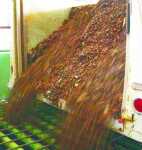Pecan harvest light this year

It's that time of year again. The leaves are falling, people are breaking out their winter clothes and the first Christmas commercials grace television sets. But for fans of the Missouri pecan, fall is the highlight of the whole calendar year -- it's pecan harvest season.
However, there is a fly in the pecan butter. For the second year in a row, drought has caused the pecan harvest to come up light. Drew Kimmell, of the Northern Missouri Pecan Growers, estimates that this year the crop will be 10 percent of a normal year.
"It's not a very good harvest," he said." It's even worse than last year."
This year, at around the first of November, after the leaves on the pecan tree have fallen, producers begin gathering the pecans. The first step involves a counterbalanced machine that grabs the tree and shakes it until all the pecans have fallen on the ground.

While this is good news for pecan producers it can be fairly traumatic for any squirrels in the tree. Kimmell reports that, instinctively, a squirrel assumes that any predator is heavier than it is so when a squirrel become scared they climb, some times running right out the top of a shaking pecan tree.
Next the harvester -- specialized machinery with 500 little rubber fingers -- picks the pecans off the ground and they are loaded into trailers. After the nuts are harvested, a cleaner sorts the good pecans from the rocks, sticks and dirt. However, a human being must still be on the final belt to pick out things like bones, bad pecans the cleaner missed and other debris, such as shotgun shells.
After grading, pecans are run through a cracker to break the shell.
The cracker grabs the pecan by the ends, sensors gauge the size of the nut and a hammer strikes it with just enough force to break the shell.
Despite low pecan yields their is a light on the horizon for some growers. Thursday Kimmell was preparing to clean and sort the first trailer of organic pecans picked in the state of Missouri. These pecans, untouched by man-made chemicals and adhering to strict state organic guidelines, came from a grove owned by Lloyd and Norma Deihl.
The advantage to organic nuts is that there is a lot more money there said Kimmell. Due to the climate of Vernon County most pecan producers don't have to spray for bugs and that makes them just a few steps away from being organic. "On a short year like this the extra money on organic is sure worth it," said Kimmell.
